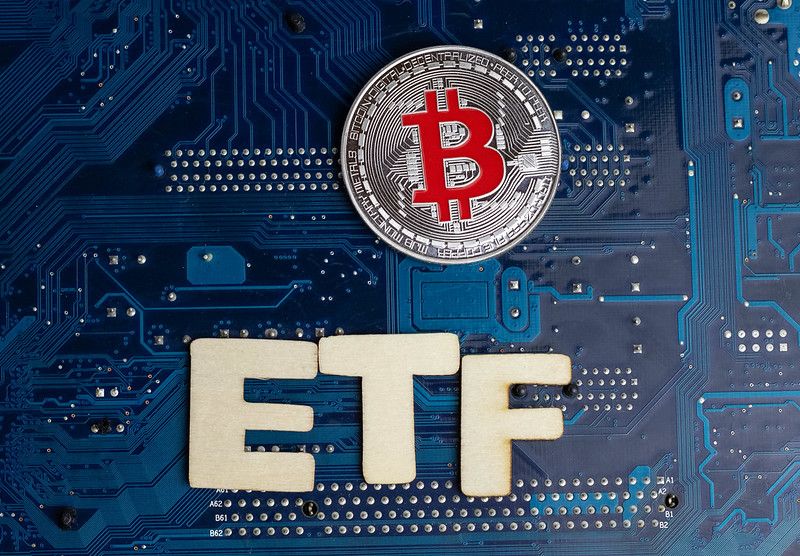Apr 30, 2021
The CF Benchmarks-powered ETFs at the top of the SEC’s queue
With the SEC’s active review of WisdomTree Bitcoin Trust and Kryptoin Bitcoin ETF Trust well underway, a look at the firms behind the filings and what to watch for next

For years now the crypto space has demonstrated its ability to remain engaged with the dry, technical details of traditional markets regulation so long as the subject of the minutiae is the potential approval of a U.S. Bitcoin ETF.
And following numerous ultimately unsuccessful efforts to get a U.S. Bitcoin ETF over the line over the last five years or so, there’s once again been ample scope for geeking out on how fiat market regulation could soon impact cryptoassets with a brace of fresh ETF applications landing on the Securities and Exchange Commission’s desk this year. As of last week, the number of active applications for a U.S.-listed Bitcoin Exchange Traded Fund had reached nine.
Predictably, interest is most heightened in the handful of filings that the SEC has signalled it is actively reviewing. Formal acknowledgement that the Commission has begun a hands-on examination of a proposed security is typically conferred by a ‘Notice of Filing of a Proposed Rule Change’ (Here’s an example). These notices, again—typically—follow the submission of a form 19b-4 by the exchange on which the sponsor intends to list its ETF. (For both WisdomTree’s and Kryptoin’s ETF that would be the CBOE BZX Exchange).
Form 19b-4 is the official and legal document submitted by a ‘self-regulatory organisation’ (like an exchange) seeking permission to list an asset: quite logically, such requests are couched in the form of a ‘proposed rule change’.
The filing of a form 19b-4 is generally read as indicating that the application to list an asset, such as an ETF, is moving up a gear and progressing to an important stage of the process.
With three of these SEC notices now having been published in relation to the brace of Bitcoin ETF applications submitted this year, it’s those three that the crypto space is most abuzz about. The buzz makes sense. If the first SEC-approved Bitcoin ETF turns out to be as consequential for crypto adoption and mainstreaming as the industry expects, its eventual occurrence could have impacts that are more far-reaching than is even widely anticipated.
With that in mind, the fact that two of the three Bitcoin ETF filings under active review at the SEC propose to use a CF Benchmarks index as their daily valuation price is welcome, to say the least, and may turn out to be significant.
Alternatively, the consideration of these filings concurrently might be purely coincidental, or simply a matter of convenience.
At this point, with disappointments from Bitcoin ETF applications of years past in mind, speculation about how the Commission might interpret key legislation pertaining to the approval (or not) of a Bitcoin ETF—and crucially whether that interpretation will differ from interpretations of the recent past—is, at best, ill-advised.
All that said, there are some key points to make about the two Bitcoin ETF applications proposing to incorporate CF Benchmarks index data that the SEC is actively considering. Given the quantifiable integrity of CF Benchmarks’ index methodology, there’s also an opportunity to outline how these applications are consequently strengthened by integrating that methodology.
First, let’s get to know the two ETF providers.

WisdomTree Investments, Inc.
WisdomTree Investments, Inc., the New York headquartered asset management firm, is one of the fastest-growing groups of its size, with approximately $68.7bn in assets under management as of March 2021, equating to asset growth of around 54% over 5 years.
WisdomTree is also among the most experienced asset managers of institutional crypto investment products. That experience is largely due to the track record of the firm’s WisdomTree Europe subsidiary, which launched Bitcoin Exchange Traded Product (ETP) in November 2019. Bitcoin ETP is ‘physically backed’, meaning that it invests directly in actual Bitcoin rather than derivatives, like futures.
Like the group’s proposed WisdomTree Bitcoin Trust ETF (which will trade under the ticker “BTCW”, pending regulatory approval) the Bitcoin ETP is “designed to offer shareholders a simple, secure and cost-efficient way to gain exposure to the price of Bitcoin”.
Note that whilst an ETF is a type of exchange traded product, the term ‘ETF’ has come to define an asset with distinct characteristics enforced by regulation and legislation that an investment vehicle called an ‘ETP’ does not possess. In the U.S., the distinction is largely encapsulated by the obligation to register ETFs as open-ended investment companies or unit trust under the Investment Company Act of 1940, whilst other types of exchange traded products do not require this registration.
WisdomTree was farsighted enough to become one of CF Benchmarks’ earliest index partners by deploying the regulated CME CF Bitcoin Reference Rate (BRR) as the calculation price for Bitcoin ETP’s indicative NAV (‘iNAV’). Bitcoin ETP thereby became one the first and remains among just a handful of crypto exchange traded products backed by a regulated benchmark index, with the methodological rigor and integrity that befits an EU and FCA regulated Benchmark Authority like CF Benchmarks.
The BRR is also unique among Bitcoin indices in that its superior integrity, replicability, and market representativeness have been validated by quantitative research, further enhancing the integrity of financial products referencing it.
Extending WisdomTree’s institutional crypto investment track record further, it launched its second crypto ETP this week. This time, the ETP is designed to track the price of Ether. Like Bitcoin ETP, Ethereum ETP (ETHW) trades on Switzerland’s SIX exchange and Deutsche Börse’s Xetra market. Likewise, ETHW is set to succeed in achieving its tracking goal given that it also uses a CF Benchmarks index as the reference index for calculation of its iNAV.
The CME CF Ether-Dollar Reference Rate (ETHUSD_RR) comes with the same qualities as the BRR, including having had its methodology backed by published academic-standard research. Plus, both BRR and ETHUSD_RR enjoy a tailwind in terms of institutional liquidity by virtue of the CME Group’s use of the benchmarks for settling Bitcoin and Ether futures, the only crypto futures markets that regulated institutions are permitted to participate in.
WisdomTree Bitcoin Trust ETF
WisdomTree’s length and breadth of institutional cryptoasset management experience as outlined above burnishes the group’s case as a preeminent candidate to become the sponsor of the first U.S.-listed crypto ETF. Deployment of CF Benchmarks’ index methodology for the calculation of the WisdomTree Bitcoin Trust ETF’s daily valuation adds further credibility to the firm’s advantage.
Here it’s worth noting that whilst both WisdomTree’s first Bitcoin investment asset and its proposed ETF would utilise our benchmark methodology, WisdomTree Bitcoin Trust ETF (BTCW) would be powered by BRR’s sister index, CF US Bitcoin Settlement Price (U.S. Close).
Essentially, however, the CF US Bitcoin Settlement Price is substantially the same benchmark index as the BRR. The only significant difference between the two is that the BRR’s reference time is prescribed as 4pm London Time, whilst, as you’d expect, the CF Bitcoin Settlement Price (U.S. Close) takes the traditional U.S. markets closing time, 4pm New York Time, as its reference time.
As to why WisdomTree opted to base BTCW on the BRR’s U.S. version, this has not been disclosed. Still, there are a few reasons why a U.S. ETF provider might wish to ‘strike a NAV’ at the time at which the BRR U.S. close references rather than the time that the BRR references.
Primarily, the BRR’s U.S.-close version obviously enables the use of a reference price at the time of the traditional U.S. stock market close that is consequently also the time at which U.S.-listed funds have traditionally struck NAV. On that basis, the attractions of such a reference time for U.S. institutions and their clients are obvious, including familiarity and the convenience of a time that is harmonised with other investment vehicles an asset management group might administer.

Kryptoin Investment Advisors, LLC
Actively involved with blockchain technology since 2016, with a management team experienced in traditional investment asset classes like gold as well as physical gold-backed ERC-20 tokens, Kryptoin’s collective cryptoasset class experience is evidently solid. The group’s commitment to launching a Bitcoin ETF is also evident given that Kryptoin first filed its Bitcoin ETF application in 2019.
Kryptoin Bitcoin ETF Trust
The firm’s Kryptoin Bitcoin ETF Trust (proposed ticker: KBTC) filing is an amendment from the one submitted in October 2019. Among the major changes compared to the initial submission is Kryptoin’s decision to switch to the use of the CF Bitcoin Settlement Price as its daily valuation index, a move which we expect to confer the same benefits as well as the same rigor and integrity as described above regarding WisdomTree’s Bitcoin ETF.
No speculating
Echoing the cautions of above, this piece isn’t the place for extended speculation about whether WisdomTree’s and Kryptoin’s Bitcoin ETF applications will prove to be successful. Nevertheless, as indicated above, the market and price integrity, stability, manipulation resistance, representativeness, and replicability of the BRR – and its U.S.-close version—have been thoroughly demonstrated, including in the seminal research paper on the BRR index published last year and updated earlier this month.
Likewise, the paper addresses best assessments of the SEC’s chief concerns about a Bitcoin ETF—potential market manipulation—as sign-posted by the SEC’s previous chairman Jay Clayton. Furthermore, the recently confirmed current SEC chairman, Gary Gensler, has signalled that manipulation is a key concern that will guide the commission’s thinking on crypto regulation on his watch too:
The SEC must ensure that crypto markets "are free of fraud and manipulation, and I think that's the greater challenge, frankly, because some markets, usually operating overseas, have been rife with fraud". – from Markets Insider.
Market manipulation is one of the indications of a lack of market integrity that the regulated BRR’s benchmark methodology was devised to address and eliminate. The research paper linked above presents empirical evidence that the BRR has objectively achieved that goal.
What happens to WisdomTree’s and Kryptoin’s applications next?
Submission of their forms 19b-4 confirmed that the SEC was actively considering their applications and fired the starting gun of the commission’s typical 45-day review period. After that 45-day stretch, the SEC would normally be expected to either approve or reject the applications. Alternatively, the SEC is also empowered to extend the review period for as long as 240 days. This up to-240-day extension was potentially triggered this week for the third Bitcoin ETF application that the SEC is actively reviewing after the SEC acknowledged (with a Notice) the CBOE’s 19b-4 filing, on March 1st, for that ETF.
The SEC’s notice referencing WisdomTree Bitcoin Trust was published on April 9th, following its 19b-4 on March 26th.
The commission’s notice referencing Kryptoin Bitcoin ETF Trust was published on April 22nd, with the 19b-4 having been filed on April 9th.
There’s really no way of knowing whether or not the SEC will extend its review periods for the ETFs.
So now we wait.
The information contained within is for educational and informational purposes ONLY. It is not intended nor should it be considered an invitation or inducement to buy or sell any of the underlying instruments cited including but not limited to cryptoassets, financial instruments or any instruments that reference any index provided by CF Benchmarks Ltd. This communication is not intended to persuade or incite you to buy or sell security or securities noted within. Any commentary provided is the opinion of the author and should not be considered a personalised recommendation. Please contact your financial adviser or professional before making an investment decision.
Note: Some of the underlying instruments cited within this material may be restricted to certain customer categories in certain jurisdictions.
Weekly Index Highlights, February 2, 2026
Crypto risk appetite weakened further into the start of February, with broad-based selling hitting high-beta first: Ether slid 20% with Bitcoin -12%. Finance tokens were relatively resilient in our CF DACS universe, but BTC implied volatility rose even as USDT funding rates eased (SIRB -116.1 bp).

CF Benchmarks
Weekly Index Highlights, January 26, 2026
Digital assets slid in the most recent week, with large caps decisively lower. BTC fell -4.7% with ETH -8.9%. Downside Beta led factor returns, +2.7%, while the Culture Sub-Category at -2.4% was least-bad in the CF DACS universe. USDT funding rose ~100 bps, while BTC's 1-week rate slipped to 1.17%.

CF Benchmarks
CF Benchmarks Newsletter Issue 99
The CLARITY Act car crash • Morgan Stanley's crypto ETF filings • Bitwise has had a busy few weeks • Nasdaq + CME deepen crypto partnership • Another IBIT feeder fund • And much more

Ken Odeluga